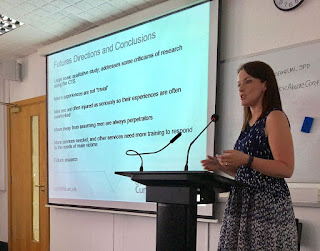Lie detectors – true or false?
One of my favourite pieces of kit to work with in the
Psychology department is the Biopac, which is a wonderful tool capable of doing
all kinds of things, but we use it most often as a Polygraph, or “Lie
detector”. Every time I demonstrate the kit, I ask participants – “do you think
the lie detector is accurate?”. The response is generally quite mixed, with
some thinking that it absolutely is, and others not so sure. One of the most
common responses is “Yes, because it works well on the Jeremy Kyle show”. By
the end of the session, they are not so sure!
How does
the kit work?
The image
above shows the Biopac that we use at the University of Cumbria, with the
attachments needed to run it as a “Lie detector”. The blue box is the Biopac
(where all of the magic happens!), and connected to it we have a chest strap,
cables to connect to electrodes, and a sensor to strap onto the index finger.
The chest
strap measures respiration rate, the cables and electrodes measure heartbeat,
and the finger sensor measures galvanic skin response, e.g. “sweat”. The Biopac
keeps track of all these and displays them on the laptop screen for you to
track.
But is it accurate? Can it tell if I’m lying?
That’s a
very good question, and unfortunately the answer isn’t that simple! Let’s
answer the first part of the question. The Biopac itself is a fantastic piece
of kit, and if it is set up and used
properly, then it can yield very scientifically accurate results. It is
extremely sensitive and can detect the most minute physiological changes in the
body. So as a piece of kit, yes, it is very accurate!
The reality
of using it as a “lie detector” is not so simple. The equipment can be
scientifically accurate, but what makes this piece of kit a “lie detector” is
the person behind the screen. Whoever has set up the kit, is asking the
questions and looking at the raw data is the one who determines whether or not
they think someone is being deceitful. The data could be producing extremely
accurate results, but it’s that person’s interpretation of the data that is
used to determine whether or not someone is telling the truth or telling a lie.
Of course, there are so many things to consider! This person may not be
properly trained, they may not have set the kit up properly, the person being
tested may be so nervous that it throws off their readings, or perhaps even
they have consumed alcohol to “calm their nerves”, which in turn affects the
accuracy of the data. You also have to take into account any environmental
factors, such as the heat of the room, and also any medical conditions the
participant may be suffering from.
In short, I
would happily vouch for the accuracy of the kit and the data, but I wouldn’t
want to be hooked up to one. You never know what kind of results you could end
up with!
Garryck Holmes is one of our Psychology Technicians. If you would like to contact him then please email him on Garryck.Holmes@cumbria.ac.uk



Tricky one. It would be great to believe that they could be useful in some sort of way when attempting to detect deception. I'm pleased they aren't used within the courts in this country at least, given the uncertainty that surrounds them.
ReplyDelete